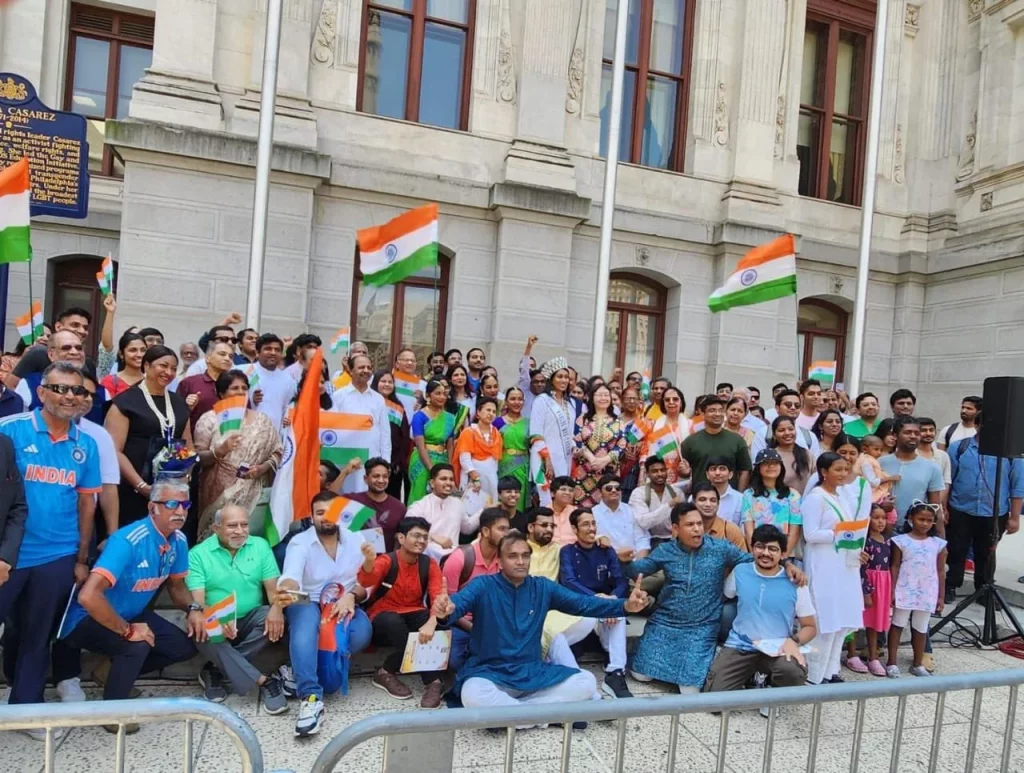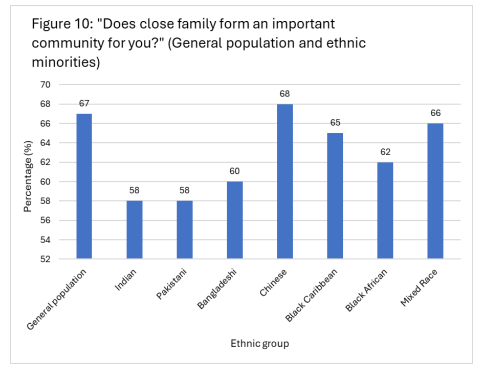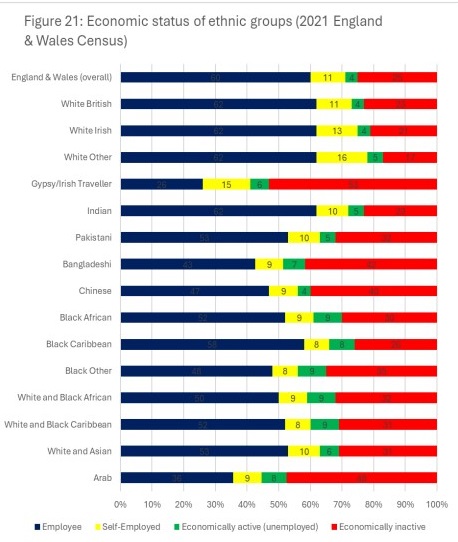(October 23, 2024) The Indian community, the largest Asian ethnic group in Britain is outperforming all ethnic groups, including white British, when it comes to the percentage that work in professions, hourly pay rate, the percentage that owns homes and the percentage in employment or self-employment. These are the findings in a recent report titled, A portrait of modern Britain, published by UK think tank, Policy Exchange, which has found that British Indians are among the most successful ethno-religious groups in modern Britain.

The rise and rise of the Indian diaspora
The modern rise of the Indian diaspora in the UK began with migration waves during the mid-20th century, notably after the 1960s. Following the expulsion of Asians from Uganda in 1972, thousands of Indian-origin families sought refuge in the UK, bringing with them a culture of entrepreneurship. Many started small businesses, mainly in retail, hospitality, and textiles. Over the years, the community expanded its reach into sectors like healthcare, where British Indians now make up a significant proportion of NHS doctors, and technology, with many working in IT and engineering roles.
According to Pratik Dattani, Founder, Bridge India, being compelled to overcome great struggles has contributed to our success. “Many migrants came to Britain as refugees who lost everything and had to rebuild their lives, such as East Africa Asians in the 1970s, who had to reinvent themselves for the second time in a generation, says Pratik. “They were the ones that led from the front in terms of helping Indians rise to the top in Britain. For example, almost all of the Indian-origin Cabinet Ministers of the last decade share this background,” he adds.
‘Education is in our DNA’
Indians have always valued education, and it has become a cornerstone of our success, leading to high representation in law, finance, and academia. Today, British Indians are among the most successful ethnic groups, with prominent figures in Parliament, including former Home Secretary Priti Patel and current Chancellor Rishi Sunak. The community’s focus on education, economic independence, and adaptability has been crucial to its achievements and integration.

“Aspiring for knowledge and prosperity are ingrained in Indian DNA,” says Rasagudha Vinjamuri, Associate Lecturer at the University of Sunderland in London. “British Indians are high ranking academic staff in many prestigious educational institutions and are an important part of National Health Services staff and doctors in the UK. One of the pillars for this is the emphasis and focus on education and educational achievements,” she points out, in a chat with Global Indian.
Another key aspect, she says, is the inbuilt culture of respecting social integration and fostering cordial, supportive and collaborative societal and professional relationships. “The entrepreneurial and social success therefore can be attributed to the ethics and disposition, besides hard work.
The home-owners
Home ownership is another important motivation usually seen in Indians, who are the biggest group of property owners in London, having important role and impact on property market. Indian households have highest rate of home ownership in England (71%), compared to all other ethnic groups.
“Indians prefer having individual dwelling, a place of belonging, hence invest and work towards owning personal residential space as much as possible,” adds Ragasudha.
Family structure
Diya Pilani, Director, Pilani Group, who own a chain of hotels in UK, feels cultural and family structures are key. “In our community, family networks tend to be close-knit, offering emotional and financial support, which creates a stable environment for pursuing challenging academic and professional careers that are often more rewarding,” she tells GI.
In fact, according to the report by Policy Exchange, ethnic groups with a tradition of a stable family life do better than those with high levels of family separations. These ethnic groups, where an emphasis on family values is high, are now outperforming whites on economic, health and education metrics.

Data: Policy Exchange
Cultural adaptability
Diya says many British Indians have successfully launched their own ventures, fostering economic self-sufficiency and success. From small enterprises to larger businesses, the community has a notable presence in sectors like retail, hospitality, and finance.
“Cultural adaptability is another important factor. While maintaining a distinct cultural identity, British Indians have integrated well into broader society and the workforce. This ability to adapt has helped the community thrive in both corporate and entrepreneurial spaces, often avoiding the same level of alienation that other minority groups may face.”
A strong work ethic, shaped by cultural values and necessity, is also a common trait. “Combined with the fact that the British Indian community is relatively young and growing, this contributes to higher employment rates and economic dynamism,” says Diya, adding there have been challenges in the form of discrimination, glass ceilings in certain industries, and disparities in political representation.
Indian values
“Our values of hard work, decent living, giving back to the wider society are the main reasons why the Indian community has outperformed,” smiles Virendra Sharma, former MP for London Ealing Southall.
Speaking to GI, he says Indian saints, scriptures and teaching inspires the community to do better. “In Britain, Indians prefer their children to have better education, hard and honest work and device. We are least dependent on social housing, lowest in benefits and very small number in prison,” says the former MP, while congratulating all Indian Origin people living in Britain.
Shaping the social landscape
“Our values of hard work, decent living, giving back to the wider society are the main reasons why the Indian community has outperformed the rest.” – Virendra Sharma, former MP, London Ealing Southall
UK-based IT Consultant and Entrepreneur Ceeka Chandra Shaker says the Indian diaspora in the UK has played a vital role in shaping the social landscape of British society.
“Migration began in the early 19th century, often during the World Wars, and has evolved over time. Today, the Indian community, particularly in the IT sector, stands out as one of the most influential and established ethnic minorities in the UK, making significant cultural and financial contributions, including substantial tax payments,” he says.
Chandra Shaker says among the UK’s billionaires, many are of Indian descent, reflecting the community’s economic success. “Indians, as the largest ethnic group, consistently outperform other groups in terms of financial contributions, with an impressive tax contribution of around £50 billion,” he informs.
IT sector
The current wave of immigrants largely consists of IT consultants who are instrumental in introducing innovative products and services to the UK market. “These professionals typically earn competitive salaries, which they often reinvest in the UK through real estate and various business ventures,” he says.
A notable shift observed over the past two decades is the reversal of financial flows. “While a significant amount of money was previously sent from the UK to India, the trend has now changed, with many individuals bringing wealth back to the UK, often through the sale of ancestral properties,” points out Chandra Shaker.
Re-investing in the UK
Local communities frequently discuss the risks associated with holding property in certain parts of India, while the rental market in UK remains attractive, offering high security and lucrative investment opportunities compared to urban areas in India.
“Despite the significantly higher capital growth in India, many individuals are choosing to invest in the UK. This preference is largely driven by the robust infrastructure, established legal frameworks, and the sense of security provided by the government,” says the IT consultant.
Additionally, he says, there is a growing sentiment among people that settling in the UK offers a more luxurious lifestyle compared to investing or saving in their home country, a shift from the trends observed two decades ago. “Beyond IT consultants, a substantial number of individuals are actively engaged in the property market, whether through buy-to-let developments or commercial property management.”

New trend
Currently, a notable trend among the Indian community is a move towards the retail sector, with many opting to open offline shops, pharmacies, and various grocery stores.
“When conversing with individuals from other nationalities, one key distinction that stands out is the Indian community’s relentless drive for success, deeply rooted in their culture. This determination is further influenced by the challenges faced during the 1980s, leading to a strong emphasis on the importance of saving,” adds Chandra Shaker.
- Discover more fascinating Stories




